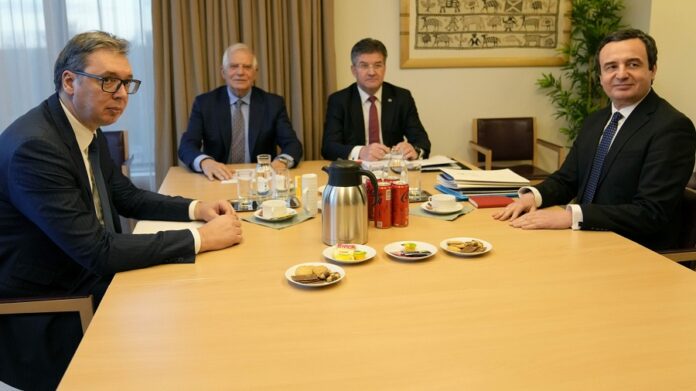The leaders of Serbia and Kosovo have agreed that no further talks are needed on an agreement to normalize relations between the two Balkan countries and expressed their readiness to continue with its implementation, European Union foreign policy chief Josep Borrell said, according to RFE/RL
Speaking on Monday after hosting talks in Brussels between Serbian President Aleksandar Vucic and Kosovo Prime Minister Albin Kurti, Borrell said the leaders agreed “no further discussions” were needed on the deal.
But he said that “further negotiations are still needed” on how the agreement and previous commitments made by the two sides would be implemented.
Borrell said earlier on Twitter that some progress had been made at the meeting and added that more work is needed.
Borrell will convene another meeting between Vucic and Kurti in March with the aim of finalizing discussions on the part of the agreement that will guide the implementation phase.
Borrell’s office published the plan later on Monday. The 11-point document says that neither side will resort to violence to resolve a dispute nor seek to prevent the other from joining the European Union or other international bodies.
“The parties shall develop normal, good-neighborly relations with each other on the basis of equal rights. Both parties shall mutually recognize their respective documents and national symbols, including passports, diplomas, license plates, and customs stamps,” according to Article 1.
“Serbia will not object to Kosovo’s membership in any international organization,” Article 4 says.
The EU previously said the agreement included other measures to improve the lives of people in both Serbia and Kosovo, which declared independence in 2008. Serbia still regards it as a breakaway province.
Miroslav Lajcak, the EU special representative for the Belgrade-Pristina dialogue, will visit Kosovo and Serbia to continue the EU’s diplomatic effort and prepare for the next high-level meeting, Borrell said.
The EU reminded both parties of their obligation to implement all previous dialogue agreements, which remain valid and binding.
Both sides agreed to refrain from any uncoordinated actions that could lead to renewed tensions on the ground and disrupt the negotiations, the statement added.
Vucic said the meeting with Kurti was “difficult,” but that he believed more meetings would take place, including one in North Macedonia on March 18. Borrell will visit the region at that time, Vucic said.
Vucic expressed hope that it would be possible to reach some compromises and to work on the implementation of existing agreements. He said he would clear his schedule to work with Lajcak on the implementation plan.
The formation of an association of municipalities with a Serbian majority has been a main sticking point, and Vucic said he continued to insist on it, while Kurti was not ready to accept it.
Kurti reiterated that the formation of an association can be considered under several conditions, including that it was „in accordance with the constitution and laws” of Kosovo and that it not be monoethnic.
After the meeting, he said there was “confirmation that the European proposal is acceptable and unchangeable” and progress is now expected on the implementation plan.
“We are on the right track and in the direction of normalizing relations. It is an agreement of symmetry, good-neighborliness, and cooperation in the future,” Kurti said of the EU plan, which also has the backing of the United States.
He said the agreement wasn’t signed because “the other side wasn’t ready to sign,” adding that it was a shame that it wasn’t signed, “since we agreed.”


